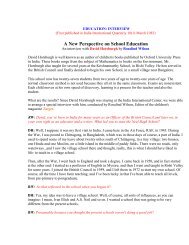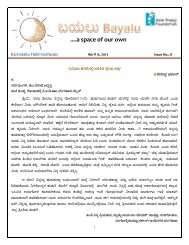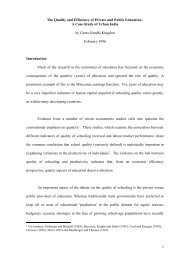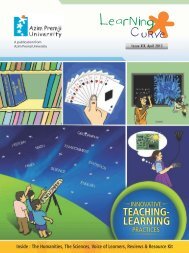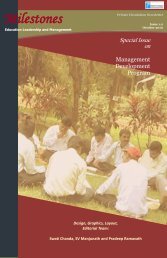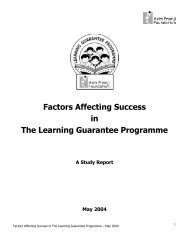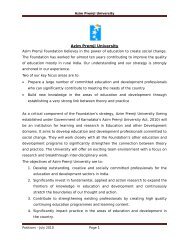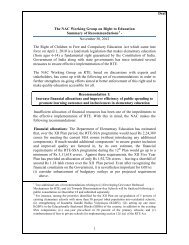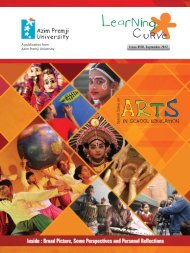Indesign Pagesnew.indd - Azim Premji Foundation
Indesign Pagesnew.indd - Azim Premji Foundation
Indesign Pagesnew.indd - Azim Premji Foundation
Create successful ePaper yourself
Turn your PDF publications into a flip-book with our unique Google optimized e-Paper software.
30<br />
Section E<br />
How History has Shaped Our<br />
World<br />
Gurmeet Kaur and Mariam Sahib<br />
As children, our world consisted of our immediate<br />
surroundings. It was only through our history lessons<br />
that we began to discover the complexities of the<br />
world we never saw. From an early age, we were able to<br />
learn about different cultures to our own from the Ancient<br />
Egyptians to the Vikings. It was through an array of learning<br />
tools ranging from songs and videos to textbooks and<br />
lessons that made history an inspiring and complete learning<br />
experience.<br />
Perhaps our love for studying history would not have been<br />
so fundamental to our thinking if it weren’t for the brilliant<br />
teachers that we encountered through our educational life.<br />
history lessons for many students are boring, lifeless and<br />
simply tedious; an hour fi lled with monotonous repetitive<br />
lecturing of the history teacher. However, our experience<br />
of history in school differed completely; our teachers were<br />
able to bring life to the subject with passion, invoking these<br />
feelings within us. Constantly hearing our teachers’ praise<br />
encouraged us to participate in class more often.<br />
Our classroom environment was not only a place where<br />
we learnt new subject matter, but also somewhere we<br />
questioned, challenged and re-assessed our views. The open<br />
atmosphere created by our teachers and peers alike gave us<br />
the confi dence to engage freely with the topics. What we<br />
looked forward to the most was interacting in class debates<br />
and asserting exactly what we believed. Far from being<br />
off-putting, the manner in which our teachers challenged<br />
our views during debates led us to search for evidence to<br />
support our points further. We were lucky enough to have<br />
peers in our history classes who felt the same passion as us.<br />
We enjoyed interacting with one another, and the experience<br />
of arguing with each other helped us become assertive. We<br />
remember vividly how engrossed we became in arguing<br />
over whatever the issue was that day rather than fi dgeting<br />
with our pencil cases - the usual pastime in other lessons.<br />
This desire and ability to express ourselves effectively is<br />
something that has stayed with us. We now feel confi dent<br />
to articulate our social and political views, and build up an<br />
argument which is grounded in evidence.<br />
Many may fi nd it hard to link how one’s world view can<br />
be infl uenced by studying a social science such as history.<br />
Studying a social science such as history has made us question<br />
the agenda of any institution and the selective information<br />
they distribute as a result of that. For example, when<br />
studying WW2, we came to see how the British government<br />
issued propaganda campaigns while censoring other sources<br />
in order to keep up the morale of the public. We often see<br />
instances of propaganda or censorship within our context<br />
today too – everything that we see is designed to infl uence<br />
us in some way. Thus, as a consumer of the media today, it<br />
becomes more important for us to question the agenda of<br />
every source, rather than mindlessly believe it. For example,<br />
reading newspaper articles from both left-wing and rightwing<br />
newspapers during the General election meant that we<br />
were able to note how political agenda affected the way in<br />
the way that the election was reported. Bearing this in mind,<br />
we could make informed decisions about who we chose to<br />
support and why.<br />
Studying a social science such as history<br />
has made us question the agenda of any<br />
institution and the selective information<br />
they distribute as a result of that.<br />
While in earlier years the focus on our history education<br />
was Britain, in later years we studied extra-European history<br />
too such as the Vietnam war, the Indian independence<br />
movement and modern America. Through this we explored<br />
the politics of power and the different ways it could be<br />
expressed – whether through colonisation, segregation or<br />
violence. Learning about the complexities of these world<br />
events helped us better understand the political situation<br />
and confl icts that we see in the world today. One of the<br />
topics that particularly struck us was the salt march led by<br />
Gandhi in the 1930s. While Gandhi led this march, it was a<br />
Pg No: 134



